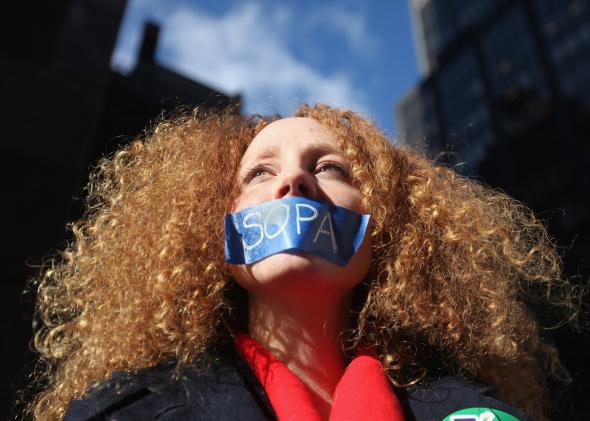You know when you break up with someone and they just don’t get the message? A few months later, they’re trying again, testing the waters with a few small things that just keep getting bigger. They friend you again on Facebook. They start liking your posts. They show up at a party they expect you to be at. They ask you for drinks, just to “catch up,” you know? And then they talk about the way things used to be, and if only you two could try again. And you’re like, “What part of ‘I never want you to be a part of my life’ did you not understand?”
The copyright lobbyists in D.C. are following this ex-boyfriend playbook.
Let’s begin with the breakup. Under the 1998 Digital Millennium Copyright Act, Tumblr, YouTube, Reddit, WordPress, and Facebook aren’t responsible for the copyright infringement of each of their millions of users, so long as they take down specific posts, videos, or images when notified by copyright holders. But copyright holders thought that wasn’t good enough. They wanted to take down whole websites, not just particular posts, and without ever going to court. In 2011, they proposed a bill that would let them do just that.
It was called SOPA.
Over the course of several months, the Internet community made it clear that, no, SOPA was not going to happen. On one day in January 2012, Reddit, Wikipedia, Google, and thousands of other websites blacked out their services or otherwise protested the bill. Millions of people called their representatives. In response to this movement, Congress dropped the bill—indefinitely. Message delivered.
But now the copyright lobbyists seem to be testing the waters again. Rather than introduce another bill, they are talking about “voluntary” commitments among copyright-holders and payment processors, advertisers, and others. And they talk about these commitments in hearings and little information-gathering events—the equivalent of an ex just trying to catch up over drinks.
This Thursday, the House Judiciary Committee, the folks in Congress who wrote SOPA, will hold a hearing about the DMCA notice-and-takedown procedure, which is one of the cornerstones of digital copyright law—and which SOPA would have gutted. But that’s not all. The U.S. Patent and Trademark Office has scheduled a “multistakeholder forum” to discuss “improving the operation of the DMCA notice and takedown system” for next month: another chance to build some voluntary consensus.
Copyright lobbyists just can’t get over the breakup; they want SOPA back. Already, they have made some Game of Thrones-esque alliances with payment processors and advertisers to pressure the tech companies they want to squeeze. Recently, I spoke to Andrew Bridges, a copyright lawyer in Silicon Valley and a partner at Fenwick & West. He said that he’s been involved in four cases in which payment processors or advertisers cut off a tech company—merely because a large copyright holder complained, without a single legal order, to the payments company or advertiser. Sometimes, the copyright holder was in the middle of litigation with his client, and the “voluntary agreement” with the advertiser or payment company was used for extra leverage. Other times, he came to believe that the copyright holder just didn’t like the industry his client was in—cloud storage, say, or virtual private networking.
The clearest public indicator of Hollywood’s intentions, though, came through at one of the last House Judiciary Committee hearings, a few months ago. It was called “The Role of Voluntary Agreements in the U.S. Intellectual Property System.” Each of the Hollywood representatives who testified at the hearing argued in favor of brokering voluntary agreements, often with the same content as SOPA. The recording industry’s top lobbyist told Congress that “legislative options” are great but that voluntary agreements may even be “much more effective.” More effective, he means, at avoiding the established legal framework and targeting websites without proving a thing in court.
These voluntary agreements are bad, bad news for two reasons.
One is the substance. It’s essentially a “voluntary” SOPA, and SOPA was bad substance. With these voluntary agreements, copyright holders can starve websites of their funding, strip them of their domain names, and remove them from search. The sites at risk include those that enable users to store and share content—if even a fraction of those users might violate copyright. So these agreements can threaten free expression and innovation online for all of us, just to target a few infringers.
The other problem is the process. Users certainly won’t be in the business development meetings where big companies are crafting “voluntary agreements.” We won’t be in the room when copyright holders whisper into the ears of their partners in the payments and advertising fields. Unlike a court of law, there will be no evidence in open court, no established processes, no published decisions, no opportunity to appeal. Our freedom to visit sites and share our thoughts might be drastically curtailed, while we won’t have a seat at the table. These agreements might be “voluntary” for the companies involved, but they’re arranged marriages for the rest of us.
Replacing the current legal framework with shadowy agreements won’t be good for anyone, except the companies who need to keep their intentions in the shadows.
Update, March 11, 2014: Disclosure: The author represented Google and other companies fighting SOPA/PIPA in 2011 and 2012. He currently represents Google and other companies on several issues, including copyright reform. These views are his own.
